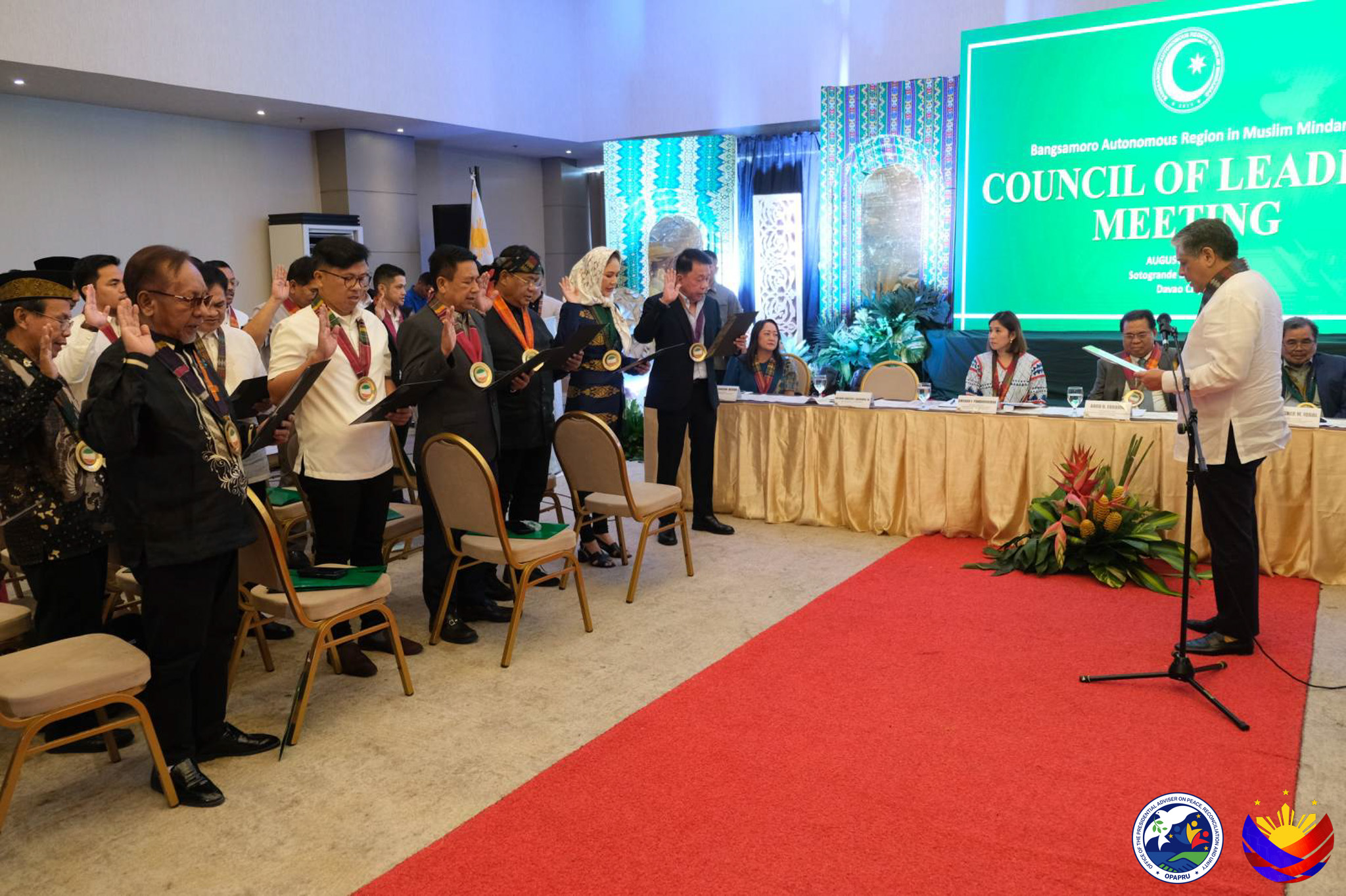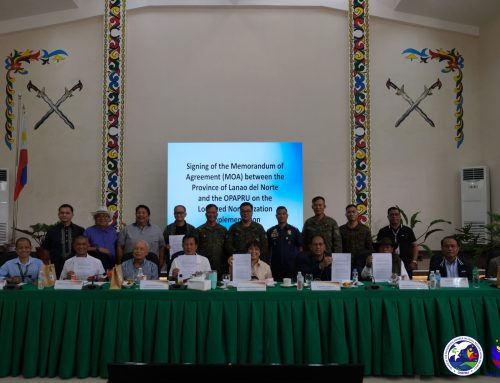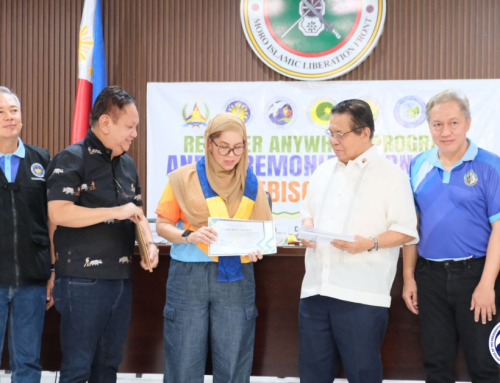DAVAO CITY – Top officials of the Marcos Administration lauded the Bangsamoro Autonomous Region in Muslim Mindanao (BARMM) leadership for ensuring greater multi-sectoral inclusivity in the region’s development and peacebuilding process.
This, as BARMM Interim Chief Minister Ahod Ebrahim convened here on Wednesday, August 9, the first general meeting of the Council of Leaders, one of the Intergovernmental Relations (IGR) bodies created through the Bangsamoro Organic Law (BOL).
Under the BOL, which established the BARMM in 2018, the Council of Leaders is mandated to give advice to the Chief Minister, particularly on matters of governance in the region.
Speaking to members of the body, Special Assistant to the President Antonio Ernesto F. Lagdameo, Jr., who administered the oath-taking of Council members, said the “establishment of the Council of Leaders as an intergovernmental relations mechanism is a significant step forward” for the BARMM government.
According to Lagdameo, who was tasked by President Ferdinand R. Marcos, Jr. to oversee the government’s initiatives in the BARMM, the Council “provides an avenue for addressing concerns, resolving conflicts and forging consensus on critical issues.”
“By bringing together different voices, perspectives and expertise, the Council can play a pivotal role in shaping the future of the Bangsamoro region [by] ensuring that the needs and aspirations of all are heard and considered,” he said.
“This collaborative approach fosters a sense of trust and shared responsibility, which are all essential for the sustainable development and stability of the region’s governance structure,” Lagdameo added.
In her remarks, Department of Budget and Management (DBM) Secretary Amenah F. Pangandaman reaffirmed the Marcos Jr.’s administration’s steadfast commitment to push forward its Agenda for Prosperity in the BARMM.
To realize the national government’s goal of uplifting the lives of the Bangsamoro people, Pangandaman noted that out of the Php 5.768 trillion 2024 National Expenditure Program for Fiscal Year 2024, P80.6 billion will go to local government units in the Bangsamoro.
“Additionally, Php 5.3B has been appropriated for the PAyapa at MAsaganang PamayaNAn (PAMANA) or the Peaceful and Resilient Communities Program,” she said, of which Php 2.5B is earmarked for infrastructure development projects in the BARMM.
“Ang Bagong Pilipinas ay nagtutulungan at nagkakaunawaan sa kabila ng pagkakaiba ng relihiyon, kulay at pinagmulan. At ang Bagong Pilipinas ay mas pinatatag ng pagkakaisa,” Pangandaman said.
Representing Presidential Adviser on Peace Reconciliation and Unity Sec. Carlito G. Galvez, Jr. during the meeting, Presidential Assistant David B. Diciano underscored the significance of convening the Council of Leaders.
Diciano said the Council “is a testament to the importance of intergovernmental relations, as we continue to work together to enhance governance systems in the Bangsamoro through joint mechanisms and partnerships.”
“The composition of this Council is a reflection of the ‘jointness’ of our governments. All of the interventions we are carrying out are a product of synergy and complementation. This is the power of convergence,” he stressed.
Diciano noted that with the convening of the Council, the BARMM government can actively engage local chief executives on matters of governance, as well as provide an avenue for the more effective implementation of the Normalization Program.
The Normalization Program, which is among the key provisions of the CAB, aims to ensure the return of Moro Islamic Liberation Front (MILF) combatants to mainstream society as peaceful and productive individuals.
“We agree with Chief Minister Ebrahim that bringing about inclusive governance is a top priority. By ensuring the meaningful participation of local and sectoral leaders in the BARMM, they will be heard and empowered,” he said.
“By improving public service delivery, we shall make sure that much-needed resources are efficiently allocated so that the initiatives we will be implementing in communities will have the greatest impact,” Diciano added.
According to Section 9 of Republic Act 11054 or the Bangsamoro Organic Law, the Council of Leaders is headed by the BARMM Interim Chief Minister. Its members include provincial governors, mayors of chartered cities and congressional representatives in the region; representatives of traditional leaders, non-Moro indigenous communities, women, settler communities, the Ulama, youth, and Bangsamoro communities outside of the Bangsamoro Autonomous Region; as well as representatives of other sectors.
Those who took their oath of office were Lanao del Sur Gov. Mamintal Adiong, Jr., Basilan Gov. Jim Hataman-Salliman, Maguindanao del Norte Gov. Abdulraof Macacua, Maguindanao del Sur Gov. Bai Mariam Mangudadatu, Tawi-Tawi Gov. Yshmael Sali, Maguindanao del Norte Rep. Bai Dimple Mastura, Sulu First District Rep. Damier Tan, Lamitan City Mayor Roderick Furigay, Cotabato City Mayor Bruce Matabalao, and sectoral and community representatives Mohammad Abqary Alon (youth), Noni Lao (Women), Mlang Madal (traditional leaders), Malik J. Caril (BCOBAR), Us. Aboulkhair Tarason (ulama), Ernie Moral (non-Moro indigenous communities), Tungko Tadtagan (professionals), Bai Shalimar Candao (business), Musa Solaiman (farmers), and Hon. Abunawas L. Maslamama (Head of Secretariat). ###


























